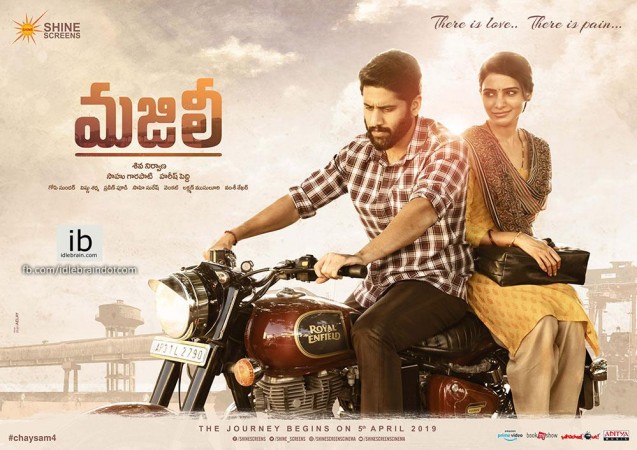In 2017, Mani Ratnam directorial Katru Veliyidai (Cheliyaa in Telugu) opened at the box-office. A hardcore love story
set against fighter jets and Kargil war, Katru
Veliyidai, gave us a woman madly in love with an abusive and unappreciative
lover. 2017 also gave us debutante director Shiva Nirvana’s, Nani-Nivetha
Thomas-Aadi starrer, Ninnu Kori. The
reason I bring these up while talking about Shiva Nirvana’s Majili, is for two
reasons – unwavering love of the leads and the dichotomous narrative juggling
between a love story and a parallel story of the hero. While Katru Veliyidai had the Indian Air Force
punctuating the love story, Majili has cricket injected into its love story.
And this dichotomy is the very problem of the movie.

Majili tracks the life of Poorna
(Naga Chaitanya) from a teen aspiring to be a cricketer to an alcoholic Devdas. During his formative years as a
regional cricketer, he falls for Anshu (Divyansha Kaushik), daughter of a Naval
officer. Just like the unauthentic Navy household, the equation between a
well-read North Indian Navy kid and an ITI student looks contrived. In the
midst of making his way to the Railway cricket team and over the course of a song,
they fall for each other. This is the binary nature of the story that I was
talking about. The writing by Shiva Nirvana gets uneven – it straddles between
a movie on cricket and a love story. This impacts the emotional intensity the
love story requires. There are a few endearing moments, such as an excited
young Poorna trying to get intimate with Anshu. But, such moments are far and
apart, and so the love story feels half-baked.

As expected, the lovers are
separated leading to Poorna ruining his career and taking to vices. Years later,
an alcoholic Poorna is married to his neighbor’s daughter, Sravani (Samantha
Akkineni), who harbours a strong crush on Poorna since her childhood. Poorna’s
strong love and longing for his long-forgotten girlfriend, Anshu, does not let
him accept Sravani as his wife. Sravani is a spirited girl, who puts a brave and
independent face to the world – she stands up for her husband and goes against
her parents and father-in-law. As a girl besotted by Poorna from her school
days, she continues to bear his tantrums and be his devoted wife. The writing helps
the audiences sympathise with her and question her decision to continue in an
unhappy marriage. For a girl who gushes over the sight of this young boy and
whose feet she touches as a teen - like a typical Indian pativrata wife - it is believable that her one-sided love made her bear
his tantrums. Like Dr. Leela Abraham (Aditi Rao Hydari) in Katru Veliyidai, Sravani displays unconditional love, but does not
reduce herself to a slave at the hands of her unappreciative husband (though
not abusive, thankfully). I just wish Sravani’s character was introduced earlier
on in the narrative, which would have been more emotionally evocative. Again,
just when this love story begins to simmer and the audience starts to question
the unaffected Poorna, cricket makes a comeback! This time, thankfully, to
unite the couple. Also, I found the timelines to be blurry – how old are they?
The teenage romance is shown to be around the period when ‘Bhoot’ came out–
implying it is set around 2003. But the events that follow make the timeline
look slightly unclear.
Keeping the cricket versus love
story aside, there are a few moments between the leads that are charming. The
awkwardness between a platonic couple married for two years is endearing and
one of my favourite scenes is the one with ‘Maata raani mounam idi’ song in the
backdrop. Samantha shows restrain and maturity that the character demands, even
while appearing to be meek. She complements the story and her husband well.
Debutante Divyansha Kaushik is decent, but does not have an impactful role.
Making her debut in a cliched girl-hates-guy-turns-into-love
template, she gets a rather raw deal. Carrying the film entirely on his
shoulder, Naga Chaitanya looks confident and delivers a rather impressive
performance. Last year when he tried the formulaic, Sailaja Reddy Alludu, I had opined that he does not have a charismatic
personality like NTR Jr or Ram Charan to carry a masala movie on his shoulders.
But, Majili seems to be resting comfortably on his shoulders, even during
certain unimpressive emotional scenes. This is a marked improvement over his
last few movies.
Like Ninnu Kori, Majili also delivers well on the technical departments,
especially the cinematography by Vishnu Sharma and the music by Gopi Sundar. Shiva
Nirvana, writing and directing again, attempts a mature love story, but falls
short of the craft that the likes of Gautam Vasudev Menon have. Like Ninnu Kori, his writing centres around a
jilted, staunch lover but he does not let the love story brew enough, often diluting
it with other elements (here it was cricket). Giving credit where it is due, his
signature dialogues such as ‘Love Letter
lo unna peru, wedding card lo radu’, are again in display.
Majili is certainly an enjoyable
watch, especially if you are sucker for love stories. But it is not entirely
engrossing and evocative.
My Rating – 3/5